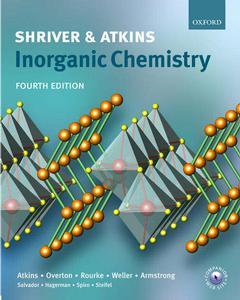Description
Inorganic Chemistry (4th Ed., Paperback)
Authors: ATKINS Peter, OVERTON Tina
Language: English
Subject for Inorganic Chemistry (4th Ed., Paperback):
Approximative price 57.26 €
Subject to availability at the publisher.
Add to cart
Publication date: 12-2005
814 p. · 14x22 cm · Paperback
814 p. · 14x22 cm · Paperback
Description
/li>Contents
/li>Comment
/li>
Restructured, rewritten, and redesigned edition of the bestselling text in inorganic chemistry. The new author team brings together chemical educators and researchers who are at the cutting edge of their fields to produce a text which combines authoritative coverage with a clear and lucid writing style. Combines the theoretical rigour of previous editions with expanded explanations and more illustrative examples, making the book accessible to the widest possible audience. Takes students from the basic concepts through to the frontiers of chemical research, making the text the ideal teaching and learning resource throughout an undergraduate chemistry degree programme.
Part 1. Foundations. 1. Atomic structure. 2. Molecular structure and bonding. 3. The structures of simple solids. 4. Acids aamp, bases. 5. Oxidation and reduction. 6. Physical techniques in inorganic chemistry. 7. Molecular symmetry. 8. An introduction to coordination compounds. Part 2. The Elements and their Compounds. 9. Hydrogen. 10. The Group 1 elements. 11. The Group 2 elements. 12. The Group 13 elements. 13. The Group 14 elements. 14. The Group 15 elements. 15. The Group 16 elements. 16. The Group 17 elements. 17. The Group 18 elements. 18. The d-block metals. 19. d-metal complexes: Electronic structure aamp, spectra. 20. d-metal complexes: Reactions in solution. 21. d-metal organometallic chemistry. 22. The f-block metals. Part 3. Frontiers. 23. Solid state and materials chemistry. 24. Nanomaterials, nanoscience and nanotechnology. 25. Catalysis. 26. Biological Inorganic chemistry.
Many of the pedagogical features are extremely helpful to the reader. In particular, the use of worked examples do a great deal to aid the students' understanding ... We also applaud the use of Key Points to identify the main components of a particular section.
© 2024 LAVOISIER S.A.S.
These books may interest you

Inorganic Chemistry 81.46 €



